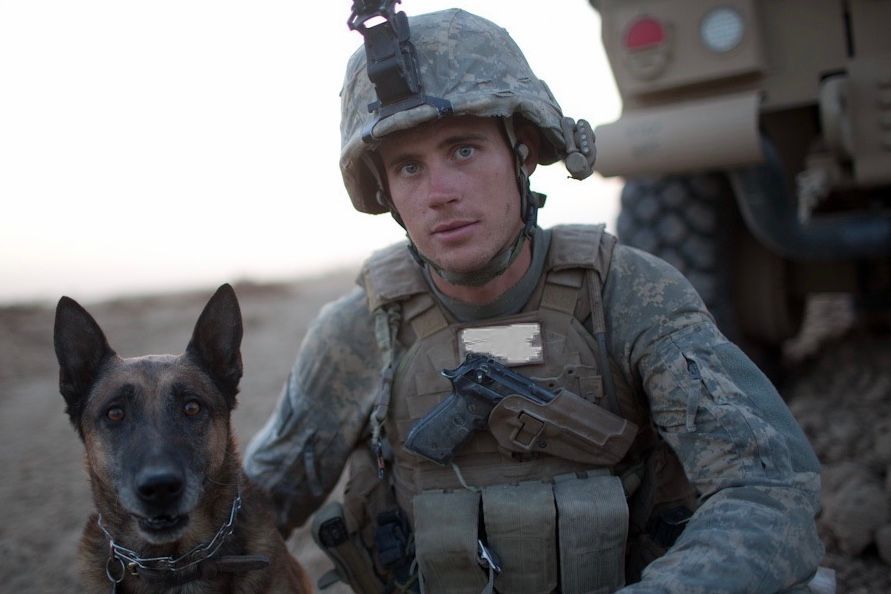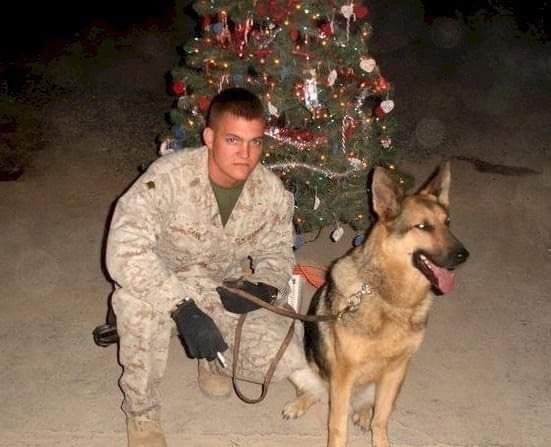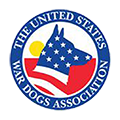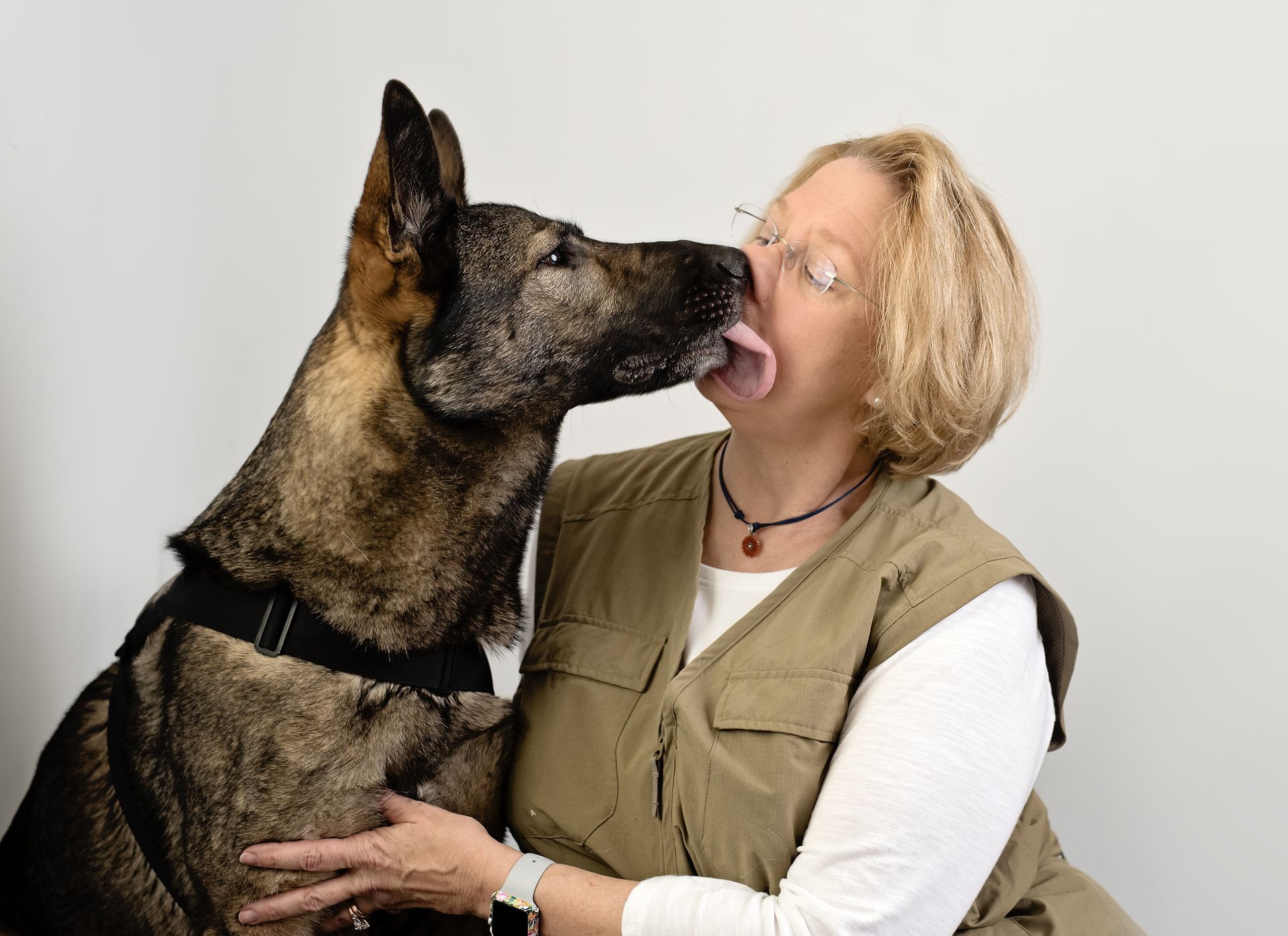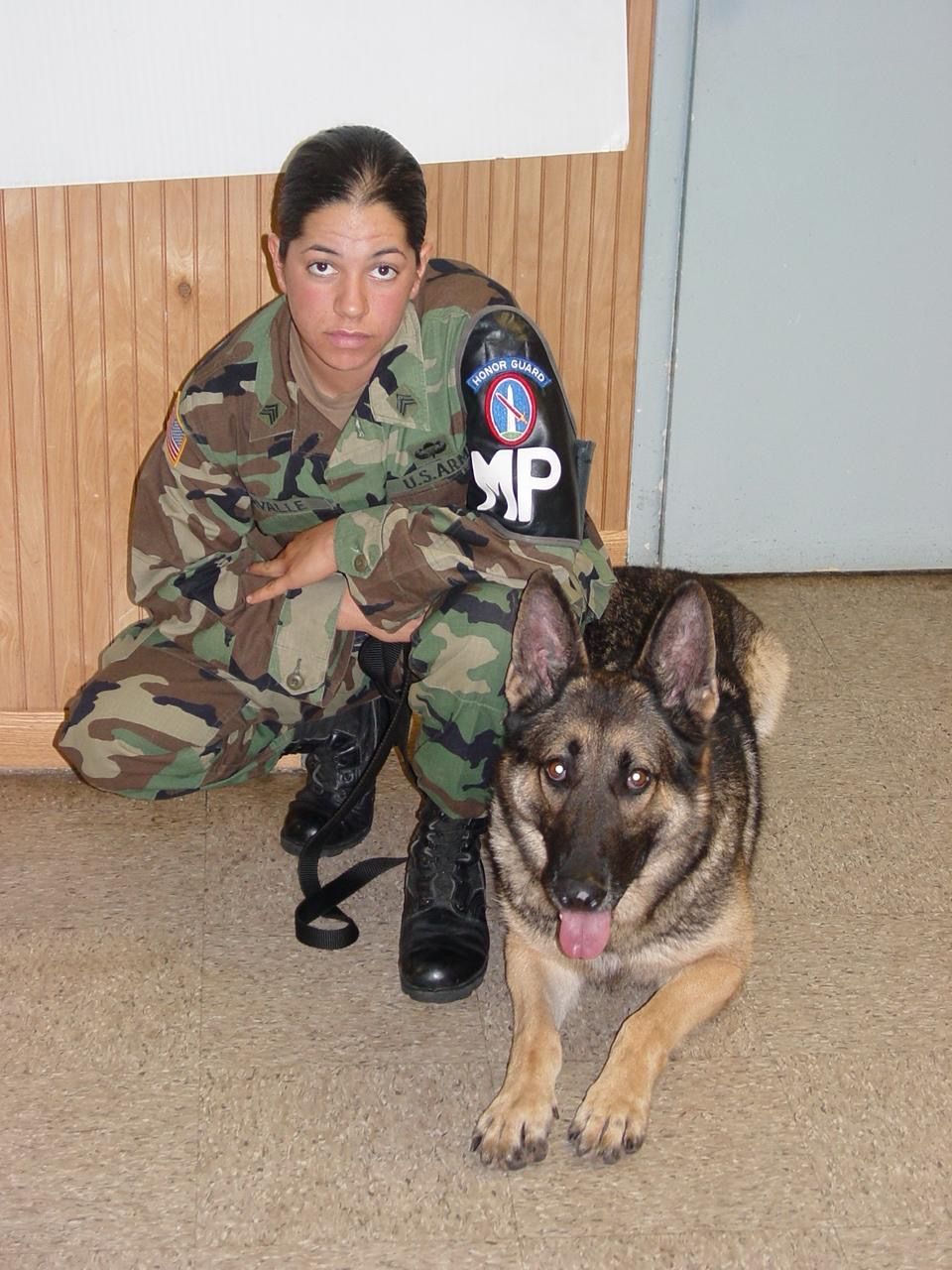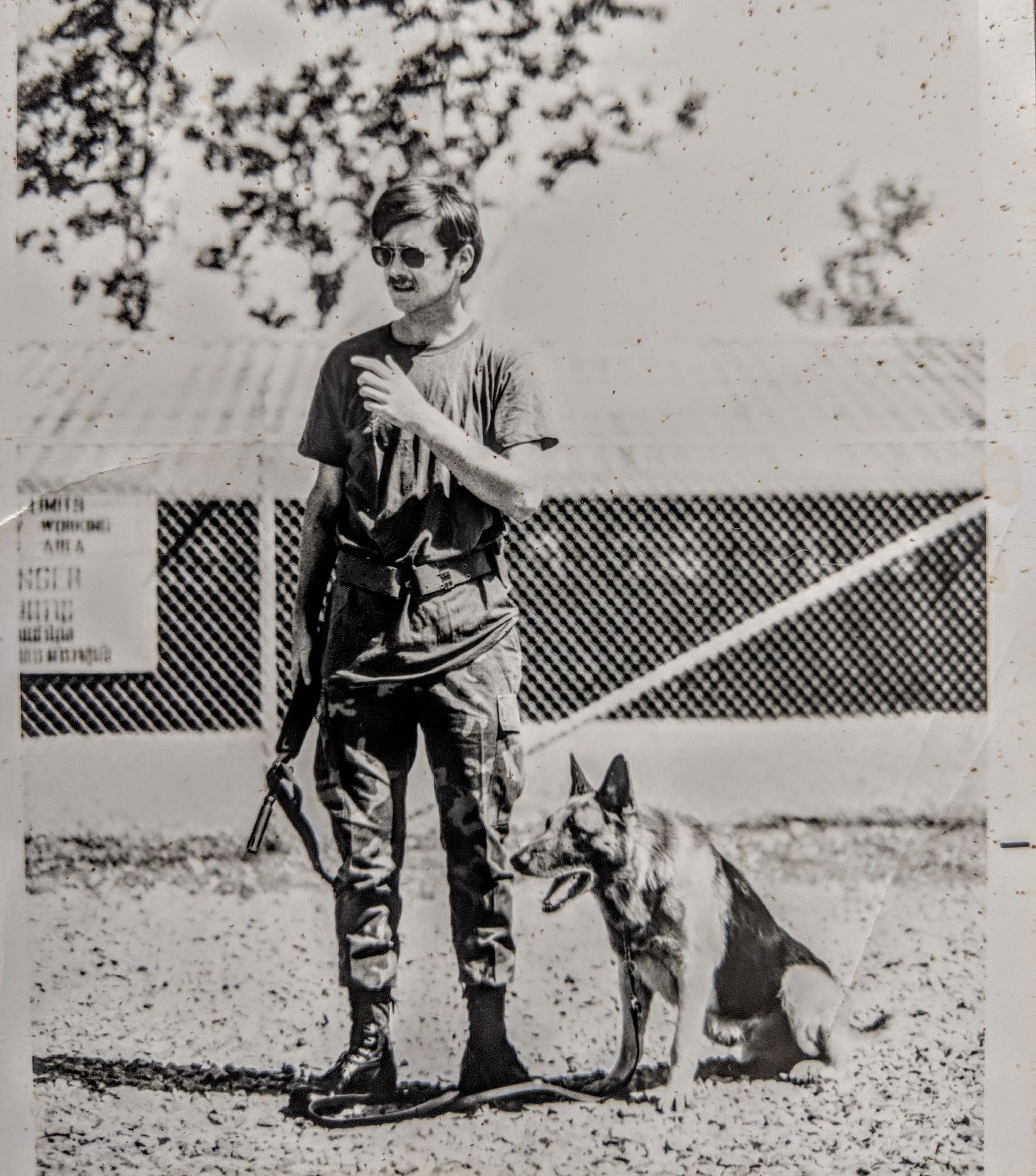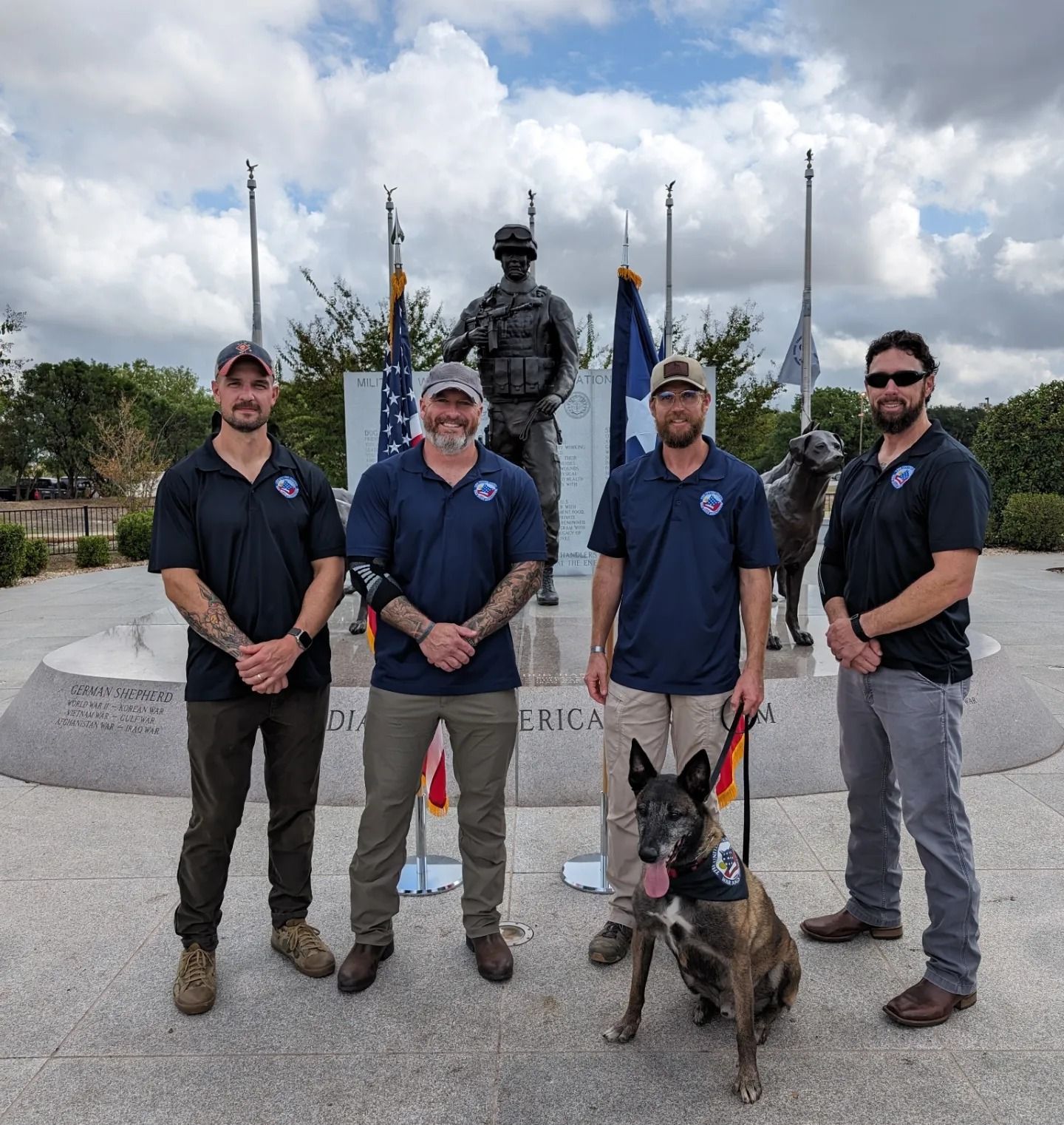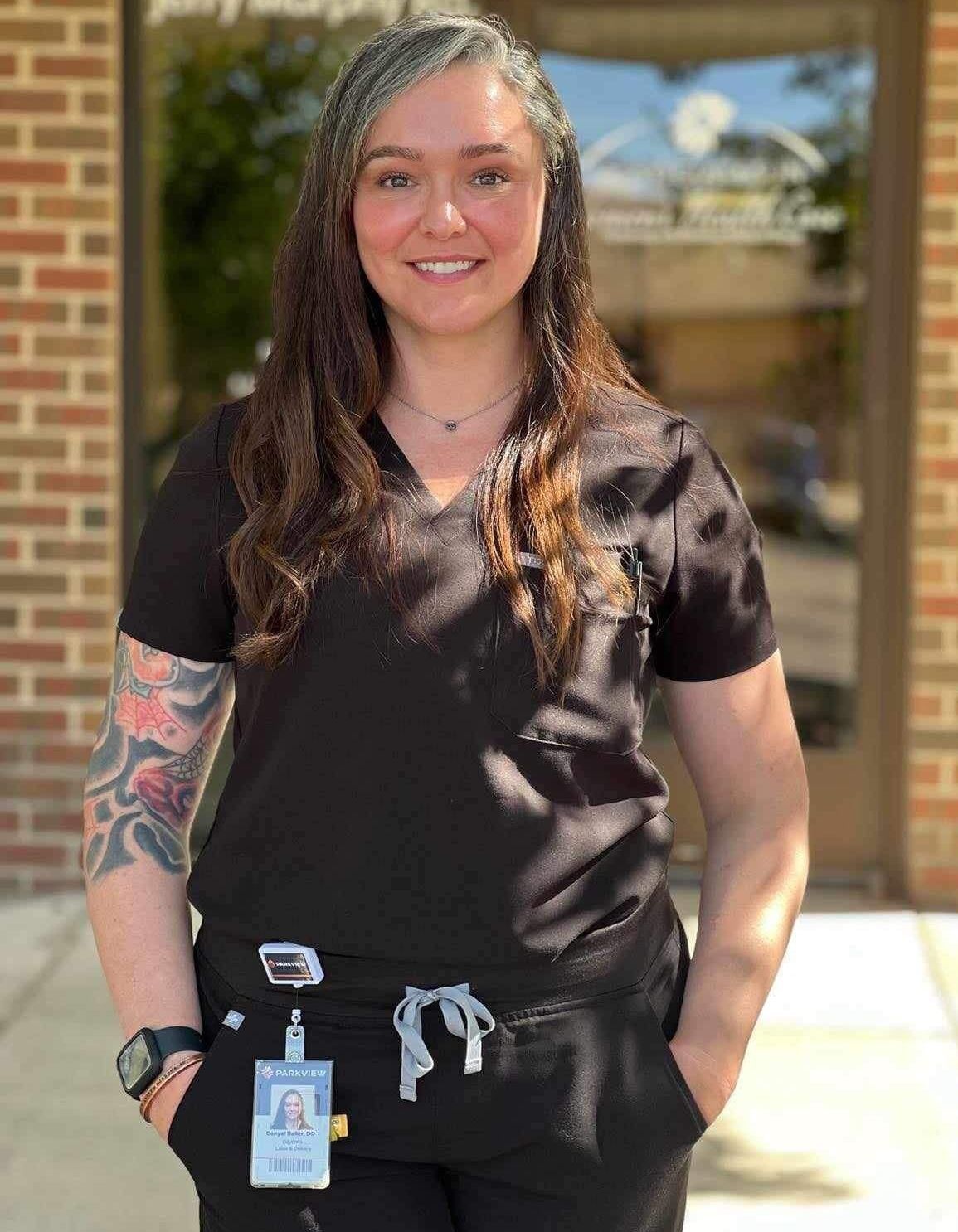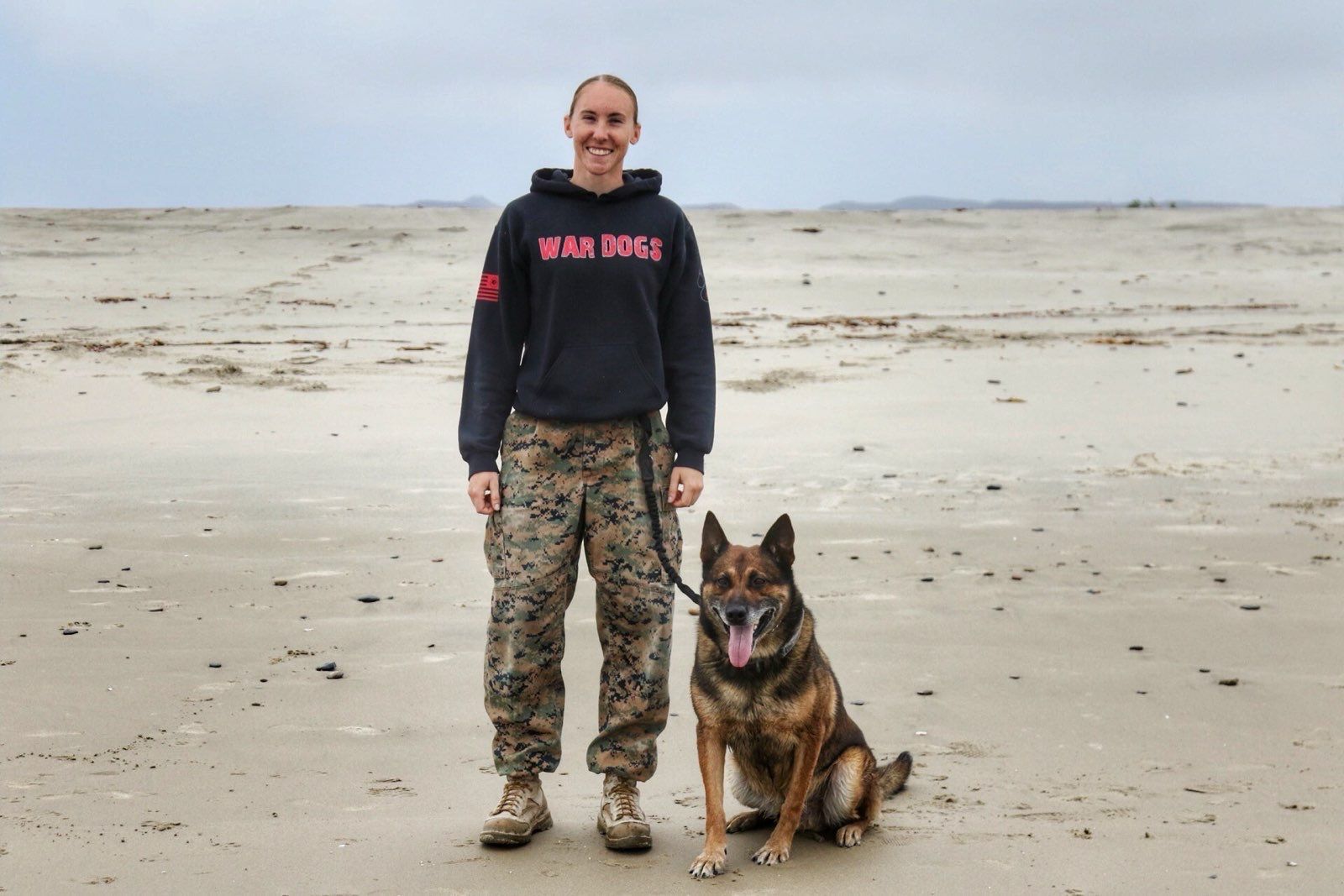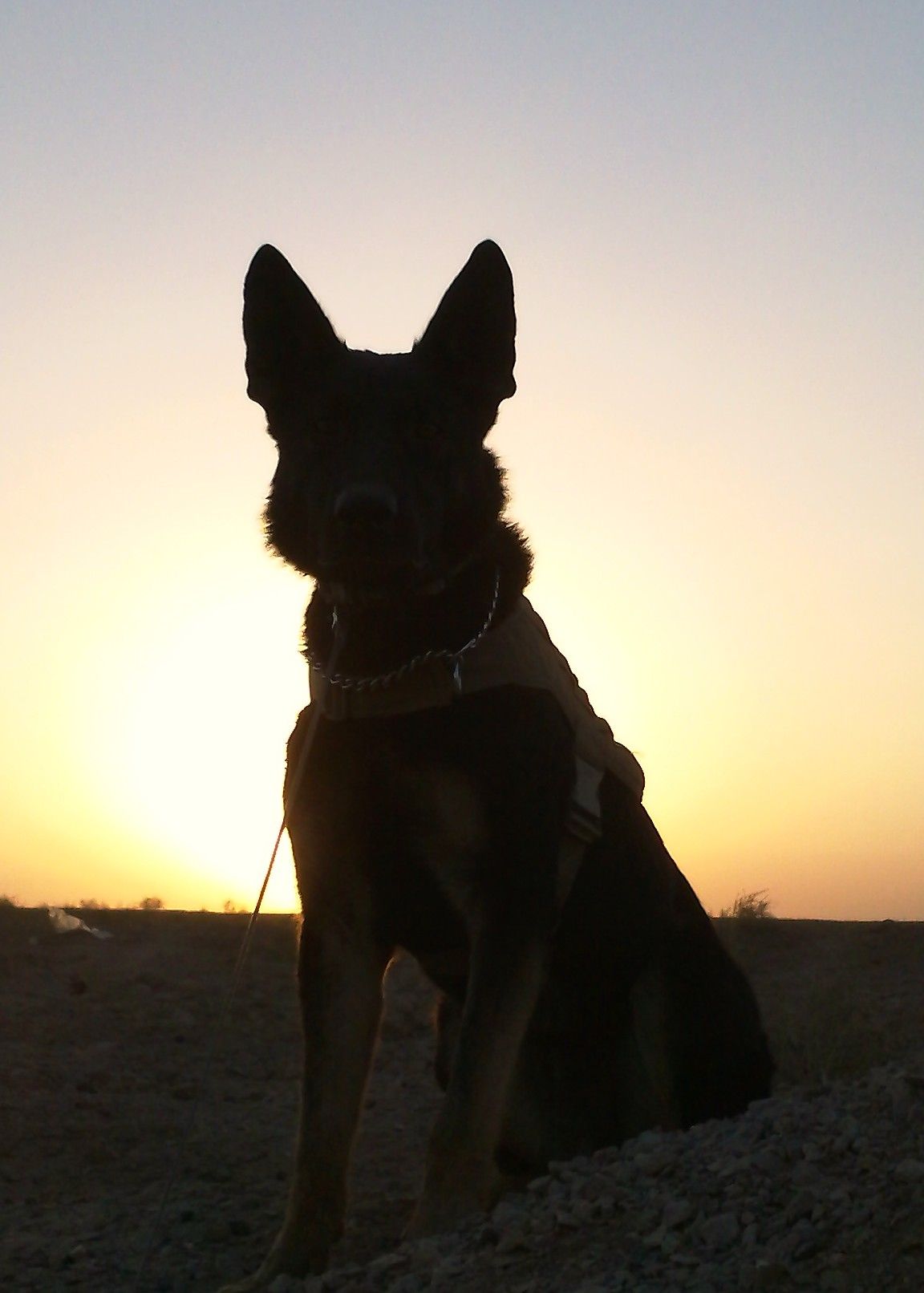
Volunteer Spotlight: US War Dogs Vice President, Chuck Rotenberry
Former US Marine Corps dog handler and trainer, Chuck Rotenberry, has been our organization’s vice president since 2021, supporting the board in making positive changes to increase support and ensure the future of US War Dogs. But before joining our team, Chuck enjoyed a rich and varied career in K-9 – bringing with him hard-fought life experiences that include a serious combat injury that totally changed the course of his life. So, on Chuck’s Alive Day, we spoke to him about his career, his combat injury and how giving back has become inherent to him.
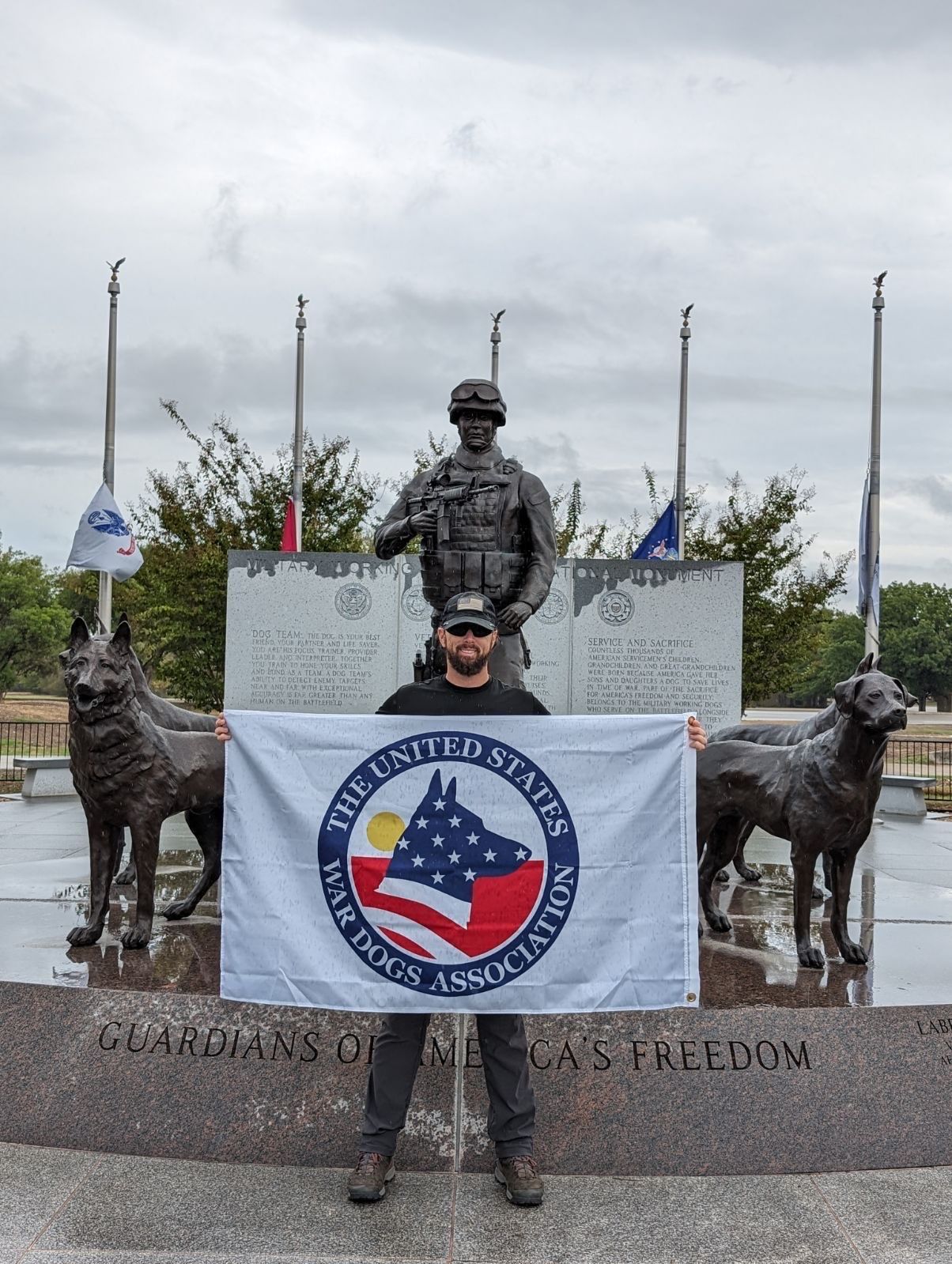
State Trooper Dreams
Like many young military personnel, Chuck had a plan to complete four years in the Marine Corps to ready him for a life in law enforcement. He was offered a scholarship to university and decided to take classes in clinical psychology, in readiness to become a cop. “A buddy and I made this plan to complete the university course before applying to the Marines, but a year in, that buddy couldn’t wait any longer and left for boot camp. This made me itchy to go too, so in December 1999, I went to Parris Island.”
Graduating boot camp as an honor graduate meant that Rotenberry began his Marine Corps career as a lance corporal: “It was subtle but that promotion meant that I was offered a couple of career options. The first was the chance to join the president’s helicopter squadron. The second option was K-9, which my sergeant pushed me on. Out of 50 young Marines who tried out for K-9, only two of us were selected.
“The process was gruelling but the more I learned about K-9, the more I wanted it. I felt really lucky to have gotten through.”
Rotenberry attended the basic handlers’ course in July of 2000 in San Antonio. “There were only seven of us in the class and again, because I was a senior Marine in the group, the instructors expected a lot of me and I definitely got some heat as the new guy.” That said, Rotenberry took to the course like a dream. “We started from the ground up, learning which end sniffs and which end shits, followed by everything from obedience, patrol, basic healthcare and first aid. I had a great class and everyone was super motivated.
“We were also lucky to have strong instructors. We would all hustle to be the first one to run drills, testing ourselves and learning from one another. That sense of competition made us all better handlers.”
After basic K-9 training, Rotenberry received orders to go to MCLB Albany, GA: A small logistics base with a K-9 unit housing eight dogs and nine handlers, including the kennel master. Here, Rotenberry was paired with his first operational dog: The 102lb Belgian Malinois, Boris. “He was a beast and was super cool, but he needed a lot of care. He stank and I was always putting cream on something or picking stuff off him with a hot towel. We took some time to get to know each other and because he had a throat issue, we couldn’t use any physical corrections in training, so his King Kong became an obsession. He would bite down on it - closing the end completely - and stare at me. I always maintained a healthy respect for him.”
The Day That Changed the World
Rotenberry and Boris spent a year supporting with law enforcement duties on base, from security checks to base patrol. They were also part of the Special Reaction Team (SRT): The Marine version of SWAT and were out collecting their new K-9 vehicles when news hit on 9/11. “As law enforcement, we oversaw securing the base’s facilities and locking everything down as the threat level was raised. We worked for almost two straight days, catching snippets of what was going on via radios and hearsay. It wasn’t until I stopped at a buddy’s house to eat something a couple of days later that we got to see and process the enormity of what happened.
“The president had spoken and we all knew that this would have direct implications on where we would be needed as Marines.”
As the threat level remained high, the military police were called upon to provide further security protection at key times, including during the Olympics in Salt Lake City, UT, in 2002. “It was only a few months after 9/11 and there was a lot of nervousness about the threat level, with it being a high-profile international event.” Rotenberry and his new GSD, Dan, attended in support of the event for the full six-week detail. “As we arrived back in Albany, we started getting calls about dogs being trained to go to Iraq.”
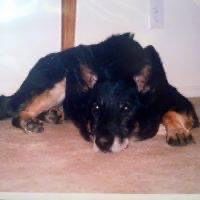
Chuck’s patrol and explosives detector dog, Dan
Chuck remained in Albany until October 2003 before moving with his new wife, Liz, to San Antonio, TX. “I wanted to train dogs that were getting ready to go overseas. It felt like there had been a lot of talk but I was keen to get into the thick of it. Nobody was deploying out of Albany so San Antonio was the place I could see myself getting a dog and actually doing something abroad.”
Rotenberry was stationed with two fellow Marines and three Air Force trainers, who had been assigned to train the puppies coming through Lackland’s breeding program. “We started on the ‘Hh’ litter and were each assigned a puppy. It was game on.”
The frequency of training stepped up, with the team receiving a trailer of 18 11-month-old puppies and having just 93 days to ready them for basic training. “It was exhausting, amazing and painful, but the whole experience was so grounding. It gave me so much exposure and experience and provided some strong foundations for times to come.”
In 2005, two years into his puppy training assignment at Lackland, Rotenberry was approached with a special assignment that involved an eight-month deployment to Iraq. “It was a non-K-9 billet, but I was more than willing to go. I started out filling a spot in HQ, in the command operations center, but I really wanted to go out and see what the dogs were doing, with a view of returning to the schoolhouse with intel. I was lucky to have the chance to see the dogs in action – going out with the K-9 guys and the MPs in the field and seeing what they were doing in the outlier posts.
“It was pretty crazy out there, so I always tried to go out and meet the new K-9 guys coming into the country. The dogs were so sought after that the new teams would arrive and immediately, would be collected by a unit to start work. There was very little pre-training or acclimatization. I also noticed how vehicle-based the work was: The dogs were doing what they were trained for, but on huge leashes.
“It was right around that time that the Marine Corps sent a senior contingent to visit and see for themselves, the issues that the dog teams were facing. By the end of that year, they were building Yuma Proving Ground.”
Returning from Fallujah in October 2005, Rotenberry was armed with the knowledge of what the teams needed to prepare for in-country. “We started doing more crowd-control focussed work with the dogs as this was such a constant requirement. That on-the-ground knowledge really helped me in the schoolhouse and I was soon straight back on the hook to train more puppies in detection. Halfway through that first trailer, I was asked to switch up assignments again.”
SSD
It was while at Lackland AFB that Chuck met Chris Willingham – a fellow dog trainer who had been in post for eight months prior. “We hit it off and volunteering for lots of new stuff together, so after I returned from Iraq and he asked me to move over to the specialized search dog (SSD) program, I didn’t hesitate.”
The SSD program was an ever-evolving mission. “It really demonstrates how our human capacity can be a huge limiting factor on the dogs. The premise of SSD is to train the dogs to detect off-leash, working at a distance away from their handlers. But how far the dogs could actually work was constantly being tested, refined and pushed, to meet the threats faced in the field.”
Chuck recalls that this style of training flew in the face of what the dog handlers had been trained to believe: “We were always told that it was too dangerous for dogs to work off-leash, but we needed to discard this belief to better understand what the dogs were truly capable of, especially after the first dog handler to lose his life since Vietnam had been confirmed. What happened to Adam Cann meant that we absolutely had to catch the threat earlier. When we lost Adam, things became very real.”
Rotenberry joined Willingham on the SSD team of instructors, who were given 12 students, 24 dogs and 120 days to ready them all for deployment. “Knowing that these dog teams would be sent down range after the course gave us a huge weight of responsibility. We knew we were doing something that really mattered.”
Of course, working on the job to develop a new specialism was fraught with issues and learning curves for the instructors. “The dogs had to be total problem-solvers, meaning that the attrition rate was higher than usual. The had to understand and trust their nose; have total obedience and adapt quickly. The calibre of the dog had to be exceptional in order to make it as an SSD.”
Rotenberry joined halfway through the first class, when the dogs were working odors. The dogs were required to search 75 meters either side of a roadway. “We thought that was amazing. But to get there, we had to come up with ingenious ways to reward dogs from a distance. We got very good at climbing trees to drop rewards in a timely manner – helping to cement the dogs’ capabilities.”
By the time the next dogs were coming through the class, the limit was 100m, with an entire search area of 500m. “We were staring to hear what the Brits and the Israelis were doing to increase their off-leash capabilities. We understood how to manipulate their skills to increase the dogs’ abilities. We learned to think like terrorists to make the dogs better.”
Changing Up
After spending a year as an instructor for the SSD program. Rotenberry was posted to Yuma Proving Ground, AZ, in 2007. But while he spent time as an instructor – readying dog teams for the real-world situations in Iraq and Afghanistan, Rotenberry was posted to Israel to train dogs with the military there. “It was an incredible experience. I was one of four Marines, accompanied by five dogs. As the senior Marine, I was tasked with training two of the dogs, with a view to learning the craft, turning around and deploying with them as an operational dog team. “Yet again, this is where seniority bit me in the butt. I returned home with my two dogs – Sally and Zafar – that I’d spent ten months training, but I was unable to deploy with them. I had been requested to take on the role as course chief back at Yuma.
“By this point, Chris was based out of Camp Pendleton and selected two Marines from his platoon to take my dogs. They were fantastic Marines and I had every faith in them, but it was tough to sever ties.”
After ten months at Yuma, Rotenberry was given the choice of supporting one of the three rotations of Marine Expeditionary Forces going overseas – either out of Camp Pendleton, Camp Lejeune or Okinawa. “I chose Lejeune as that would put me in a holding pattern to deploy.”
Afghanistan
The holding patter ended in December 2010, when Rotenberry led a 30-dog team deployment to Afghanistan. “We were the second largest deployment of dog teams after the first contingent of K-9 left from Camp Pendleton earlier that year. We were headed out to replace them. The turnover we had and the experience of the incumbent 30 teams was key – we spoke to them to provide the perspective we needed, such as how much could the dogs do before needing to come back in?
“Afghanistan was gigantically different to Iraq, both in terms of terrain and rules of engagement. Iraq was like the wild west, but Afghanistan was like going from JV to Varsity, in terms of combat.”
Chuck recalls that before they even landed in-country, there was a call for a ten-dog requirement to go out in support of missions. “I was briefing capabilities and limitations: Lining up what the units wanted. When I was out there, I chose to take the spotter position, being an overwatch for the K-9 team or pack-mule with whatever extra gear was needed.
“Getting out in the grind and the mud and seeing the dog handlers performing amazing work was very humbling. Some of these dudes weren’t old enough to drink a beer yet, but here they were, making a difference walking point.”
On March 29, 2011, Rotenberry was out on a dismounted patrol with a team of handlers who were preparing to do a clearing operation. “We were getting ready to move in on a small town, moving in file down a steep hill. I was an extra pair of hands – carrying gear for the guys and keeping an eye on the dog teams.
“One moment, I was descending from the top of the hill and the next moment, I was laying in a plume of dust, near to the bottom of the path we’d just taken. As I came to, I took in the scene: The dog team in front of me and the Marine with the metal detector were over 20 yards away and two Marines behind me had sustained catastrophic injuries in an IED blast, that turned out to be around 20lbs-worth. I got up and started finger sweeping in the moon dust-like ground for secondary devices as I made my way back to the Marines behind me.”
Fellow dog handlers continued to search for secondaries. “One of the handlers shouted across to me that I was dripping blood, which is when I realised my right ear didn’t work. We continued for the next six hours to complete the mission.”
The platoon Corpsman performed a concussion assessment test - which Chuck failed. “I didn’t feel anything but they ground MEDIVAC’d me out, where the Battalion surgeon removed shrapnel from my wounds. The adrenaline took half a day to wear off. I just thought that everyone else had been hurt but not me, but a few weeks after, when I was going to the chow hall one day, the master sergeant asked me to get him some food. I forgot and went back again. And again. After the third time, I realised that something was badly wrong but I tried my best to keep things to myself.”
TBI
On returning to Camp Lejeune after leave, Rotenberry was on course to build back up to redeploy – setting up pre-training and advanced training schools and testing the dog teams’ capabilities. “We knew how to fulfil the mission and get the next group prepared. I knew what it was like out there and it was humbling to be able to pass on that real-world knowledge. It was also imperative that we were on top of our game the entire time.”
But Rotenberry couldn’t hide his unseen injuries, despite his best efforts. “Those close to me could tell something wasn’t right. Sam Schnell was one of my go-to guys and one day, while still downrange, he helped me load up a flatbed with dogs and drove to the training site. I rode shotgun and when we arrived at the site, I had no idea where I was or what we were doing. Sam was great, but the writing was on the wall.”
The realization of what had happened to Chuck compounded when the platoon finally returned home on Independence Day. “My wife, excited for me to drive home, handed me the keys. But I couldn’t remember the way home, which was just a few miles away.” A short time later, the other symptoms of what was later diagnosed as a traumatic brain injury (TBI) crept in. “I could train dogs and Marines, but I couldn’t do anything else. The migraines, disorientation, sense of smell and hearing all deteriorated. A year after the blast, I simply couldn’t do the job any longer to my standard.”
In July 2012, Chuck left the Marine Corps and spent a further one and a half years as a reservist, out of Quantico, VA, before failing a medical exam to re-enlist. “I failed the test horribly. It was time to face up to how much things had changed for me.”
Life Change
Chuck recalls the huge shift as he and his family adjusted to life with his injury. “I had to circumnavigate life around the TBI. I would suffer four or five debilitating days each week, making it profoundly difficult to keep set routines.”
Rotenberry started working as a dog trainer for TSA and moved to Virginia Beach, VA, with his wife and four children, to pursue life as a civilian with a significant – and unseen – battle scar. “We stayed in Virginia until 2014, when we moved to Maryland to be closer to family. I moved with the TSA and felt so fortunate to stay close to K-9 after leaving the Corps.”
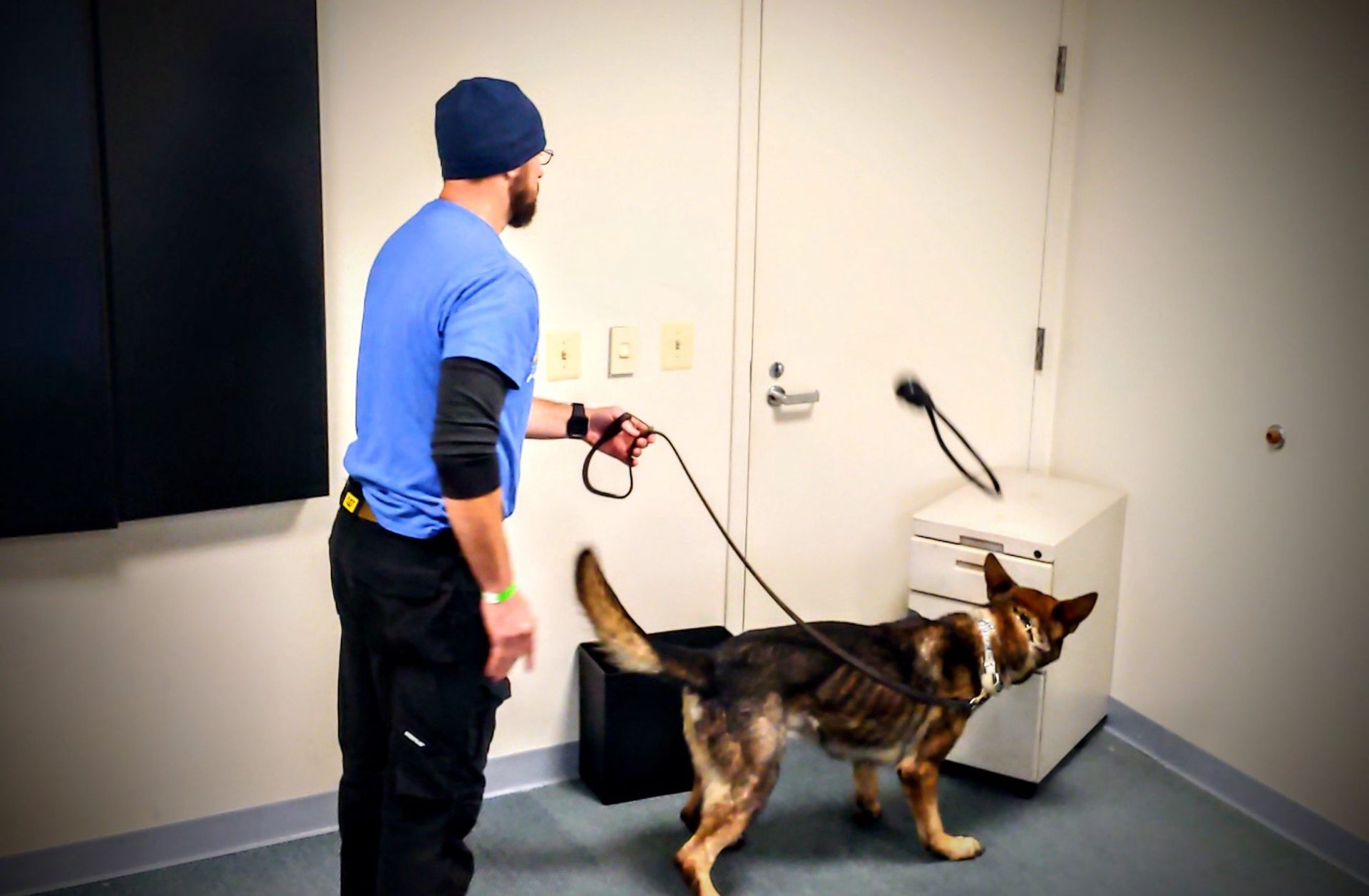
Chuck continued to train dogs in a civilian capacity, with TSA
Treatment and Therapy
The symptoms of Chuck’s TBI increased in severity to the point where major medical intervention was required. In 2013, Chuck became aware of hyperbaric treatment therapy – a revolutionary method of treating the symptoms of TBI. “We had to fundraise the $20,000 for the treatment as it wasn’t covered by the VA. Once I’d had the therapy, it was a revelation. I felt so much better and more like me, I couldn’t keep it to myself. There was some money left over from the fund we had raised to cover my treatment, so my wife Liz and I decided to try and help others who needed the therapy.
“We set up our own nonprofit, Walking Point, to help fund treatments and ancillary care, such as transport to appointments, for veterans.”
In total, Walking Point helped around 18 veterans, who received anywhere from $12-$18,000 to cover treatment and other costs. The availability of the treatment increased and the Marine Corps built a center to help those with TBIs to access the care they needed. “We had bridged a gap for those guys and girls who needed it, but it felt good to know that there was now a place that veterans could go to access that care, even though it was still in the 'study' phase. We are immensely proud of the support we were able to provide over the course of five years.”
In 2018, as Walking Point’s mission had ultimately been fulfilled, Chuck pivoted to a new K-9 career in Maryland – training dogs for the Government. But the call to help veterans rang out once more, via his long-time friend and former SSD instructor, Chris Willingham. “Chris had been in touch with US War Dogs president, Ron Aeillo, who was looking to retire and had selected Chris to take his place. Chris asked me to join as his vice president. I accepted without hesitation.”
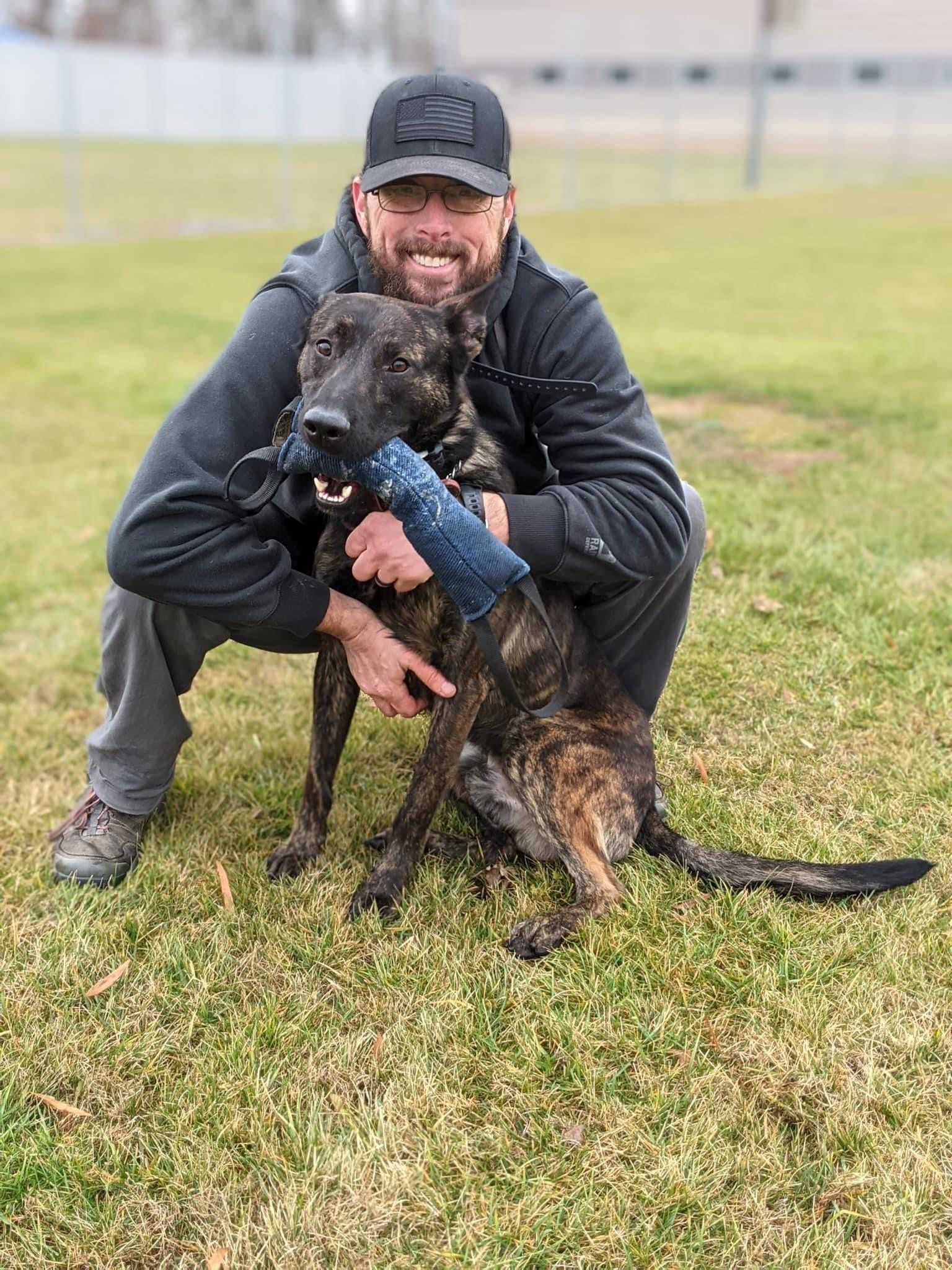
Training dogs for the Government: Chuck remained close to K-9
In 2021, after a thorough and lengthy turnover process, Chuck became US War Dogs’ vice president. “Taking the organization forward, through a rebrand and a refresh of our support programs, has been really special.
“Knowing that we are supporting dogs with everything from care packages during their active duty careers to medications and surgeries during their retirement, means the world to us as a board. We are helping to make it possible for handlers to adopt their dogs, because we cover the costs that can make that decision prohibitive.
“Working alongside fellow Marines and providing this level of support to the K-9 community is therapy for the soul and I feel so grateful that we are here for the next generation of dog handlers.”
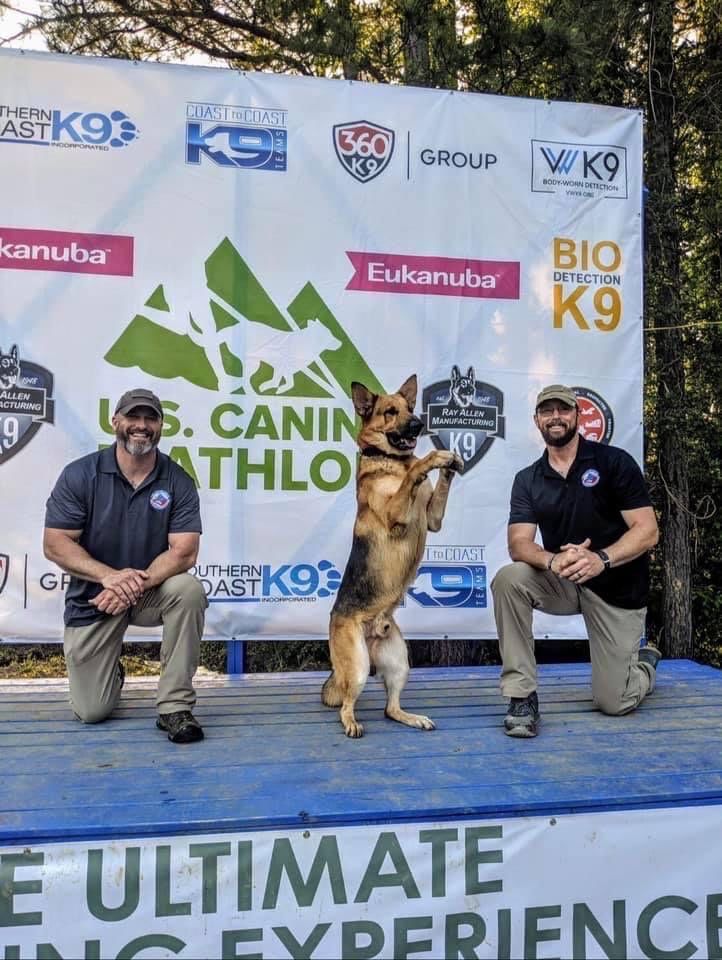
Vice president Chuck, representing US War Dogs with president Chris Willingham
